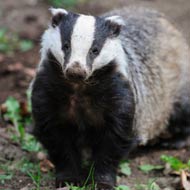
Organisations acquire TB vaccine following global shortage
Wildlife groups have resumed their badger vaccination schemes thanks to a new supply of TB vaccine obtained by Derbyshire Wildlife Trust.
In December 2015, the World Health Organisation announced there was a global shortage of TB vaccine for humans, meaning The Wildlife Trusts had to suspend their badger vaccination programmes.
But after several months of negotiating supplies and obtaining permission from the Veterinary Medicines Directorate, Derbyshire Wildlife Trust gained permission to import the InterVax TB vaccine from Canada.
Derbyshire Wildlife Trust chair and veterinary surgeon, Dr Sue Mayer, who secured the vaccine, has been training 12 volunteers in how to use the new delivery system. Thirty badgers have already been successfully vaccinated, including 12 badger cubs, and the next round is just getting underway.
Dr Mayer Commented: “Derbyshire Wildlife Trust is delighted to be leading the way across the country and vaccinating badgers against TB in 2017. UNICEF now say all country needs for human TB vaccine can be met so we wanted to start vaccinating badgers as soon as we could.
"Vaccination is a better solution than culling which research indicates can spread the disease further. It’s also cheaper and avoids the indiscriminate killing of healthy animals.”
Derbyshire Wildlife Trust has been carrying out the badger vaccination programme across Derbyshire since 2014 – working with farmers and landowners, including The National Trust and the National Farmers Union.
Its success in acquiring InterVax has also allowed other vaccination programmes across the country to resume, including those of Chester Zoo, Nottinghamshire Wildlife Trust and Berkshire, Buckinghamshire & Oxfordshire Wildlife Trust (BBOWT).
Nottinghamshire Wildlife Trust is due to begin vaccinating badgers on the Nottinghamshire/Leicestershire border imminently. BBOWT’s badger vaccination programme also resumes this month and will continue until November.



 The RCVS has announced a new version of its 1CPD mobile app, with enhanced features for veterinary surgeons and veterinary nurses to record their continuing professional development.
The RCVS has announced a new version of its 1CPD mobile app, with enhanced features for veterinary surgeons and veterinary nurses to record their continuing professional development.